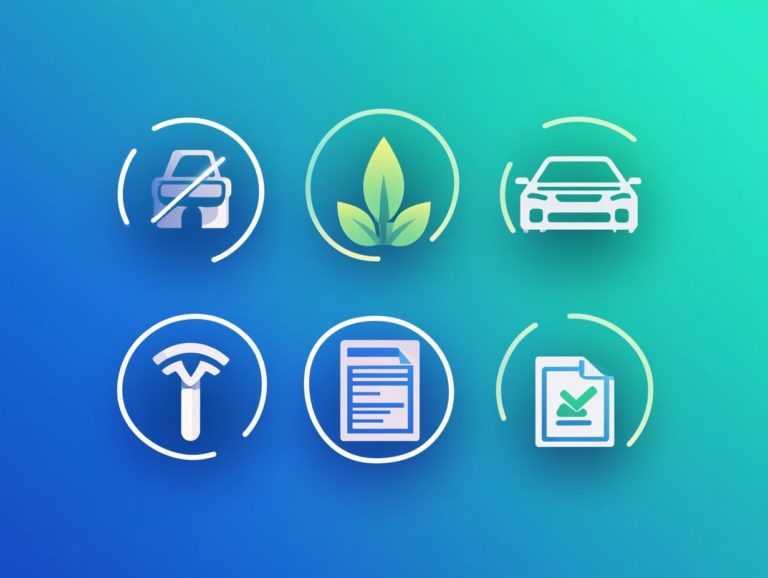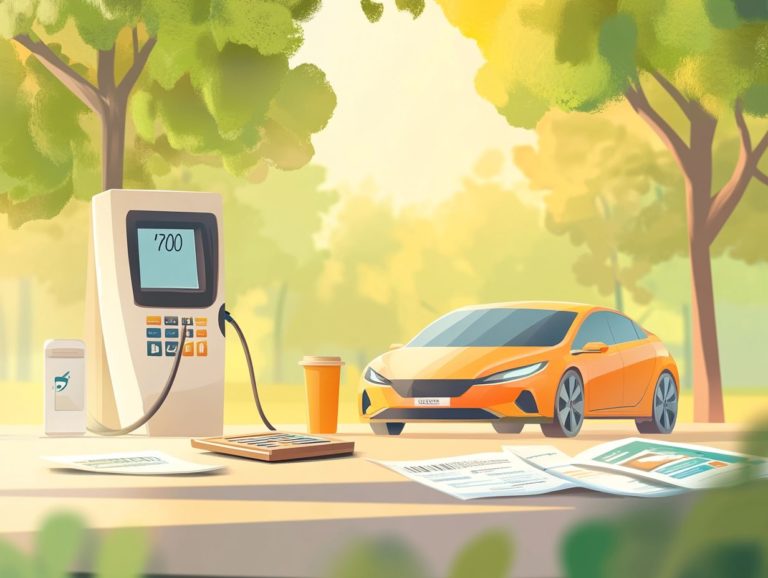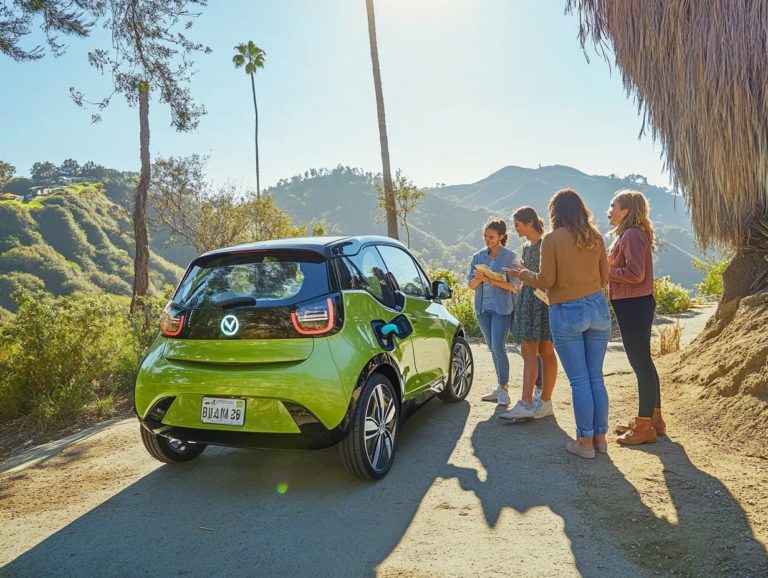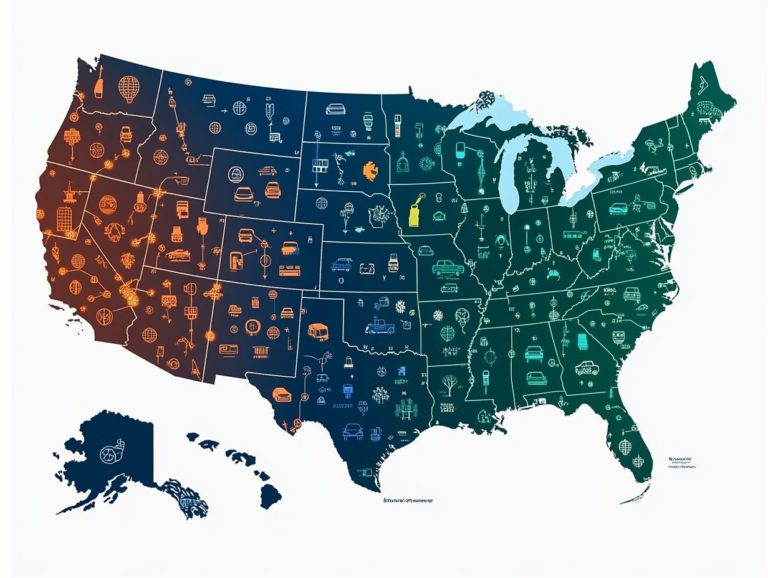how to stay updated on ev incentives
Electric vehicles (EVs) are a sustainable choice that come with various incentives designed to enhance affordability and accessibility for you.
Understanding these incentives is crucial for potential buyers like you who want to maximize savings. From government rebates and tax credits to offers from utility companies and specific state programs, the landscape of EV incentives is diverse.
This guide explores the different types of incentives available, provides insights on staying informed, and offers practical tips to help you leverage these benefits effectively.
Whether you re a first-time buyer or considering an upgrade, you ll find valuable information ahead to empower you as you confidently navigate the EV market.
Contents
- Key Takeaways:
- Types of EV Incentives
- How to Stay Informed on EV Incentives
- Maximizing EV Incentives
- Frequently Asked Questions
- What are electric vehicle (EV) incentives?
- Why is it important to stay updated on electric vehicle incentives?
- How can I stay updated on EV incentives?
- What resources can I use to find information on EV incentives?
- How often do EV incentives change?
- Are there incentives specifically for low-income individuals?
Key Takeaways:

Stay updated on EV incentives by regularly checking the best online resources for EV incentives and subscribing to newsletters from government agencies and EV news sources.
Join EV communities and forums to stay informed on the latest incentives and share tips and experiences with other EV owners.
When purchasing an EV, work with dealerships to ensure you take advantage of all available incentives and tax credits.
What are EV Incentives?
EV incentives are financial perks like tax credits and rebates offered by federal, state, and local governments to encourage you to embrace electric vehicles (EVs) and support sustainable transportation.
These incentives lower the overall cost of purchasing electric cars, making them more accessible for everyone.
Beyond federal tax credits, various programs provide financial support for charging infrastructure and EV maintenance. These incentives aim to cut your purchase price and expand charging stations, making EV ownership even more convenient!
Incentives can vary widely; for instance, rebates for low-income households, like those from the Clean Cars for All program, specifically target communities needing financial relief.
These initiatives help lower emissions, meet environmental standards, and encourage a shift toward cleaner transportation options. Consequently, you can reap substantial long-term savings from reduced fuel and maintenance costs associated with electric vehicles.
Types of EV Incentives
You ll find a variety of EV incentives available, including government rebates, tax credits, utility company offers, and local programs designed to encourage the adoption of electric vehicles.
These opportunities can significantly reduce the upfront costs of purchasing an electric vehicle, making them more attractive to a wider audience.
By understanding the different types of incentives, you can maximize your savings and make informed decisions as you consider your EV options.
Government Rebates and Tax Credits
Government rebates and tax credits play a pivotal role in encouraging you to adopt electric vehicles, offering significant monetary savings that enhance their appeal.
These incentives vary by state and often come with specific eligibility requirements, such as vehicle price limits and emissions standards.
For instance, the federal tax credit provides substantial benefits for new EV purchases, particularly under the provisions of the Inflation Reduction Act.
In addition to federal incentives, many states have launched their own rebate programs, further promoting electric vehicle ownership. These state-level initiatives often focus on low-income residents or those purchasing specific models, fostering a more inclusive approach to sustainable transportation.
As you consider these financial incentives, you may find that the combination of rebates, tax credits, and favorable loan options makes EVs not only an environmentally conscious choice but also a wise financial investment.
Over time, the savings from these programs can add up, helping you offset initial purchase prices and reduce overall operating costs associated with electric vehicles.
Utility Company Incentives

Utility company incentives offer great benefits for electric vehicle owners. You can enjoy rebates for charging stations and lower electric rates, which help you save money!
These incentives aim to promote renewable energy use and reduce costs related to charging electric vehicles. Many utility companies are rolling out programs to help you transition from gasoline vehicles smoothly.
By offering discounts during off-peak hours, you can charge your vehicle at lower costs, further reducing your expenses. Some utilities even provide charging costs that vary by time of day, rewarding you for charging during specific hours.
Grants for home charging equipment can significantly offset your initial investment, making it financially viable to set up your own charging station. These initiatives not only ease the financial burden on EV owners but also enhance the charging infrastructure, contributing to a cleaner future.
Local and State Incentives
Local and state incentives provide specific benefits that reduce the costs of owning an electric vehicle. Programs like California’s and Oregon’s support your switch to electric vehicles.
Organizations like the Coltura nonprofit also play a significant role in promoting e-mobility and advocating for sustainable transportation in your community.
By offering tax rebates, grants, and even preferred parking spots, these local initiatives help to alleviate your financial burden while enhancing the practicality of owning an electric vehicle.
For example, in Colorado, you can access tax credits and rebates that lower the initial costs of purchasing an EV, making the choice much more appealing.
Such programs encourage consumer adoption and align with federal initiatives like the Electric Vehicle Tax Credit, creating a comprehensive framework for sustainable transportation.
As a result, many states see a surge in EV registrations, highlighting the positive impact of these targeted incentives in guiding consumer choices toward greener options.
How to Stay Informed on EV Incentives
Staying updated about the latest EV financial incentives is essential if you’re considering buying an electric vehicle.
There are several effective ways to do this, such as utilizing online resources, subscribing to informative newsletters, and engaging with EV communities.
Websites dedicated to electric vehicles often provide timely updates on available incentives, including tips for maximizing your electric vehicle incentives. Local dealerships are also valuable sources for insights on current offers and lease deals.
By understanding the ever-changing landscape of EV incentives, you can unlock significant savings and make informed purchasing decisions.
Online Resources and Newsletters
Online resources and newsletters are essential tools for consumers wanting to stay updated on the latest EV incentives, including understanding state-level EV incentive programs, federal tax credits, local rebates, and charging costs.
Various websites and platforms offer comprehensive guides, savings calculators, and timely updates on the electric vehicle market, ensuring you have access to critical information that can influence your purchasing decisions.
By subscribing to relevant newsletters, you can receive personalized updates tailored to your interests. Platforms like the U.S. Department of Energy’s Alternative Fuels Data Center, along with popular automotive sites such as Edmunds and Cars.com, frequently publish articles and comparison charts highlighting the future of electric vehicle financial incentives available to you.
Newsletters from organizations like Plug In America also provide valuable insights on upcoming policy changes and regional incentives that may interest you.
This wealth of timely information not only empowers you to make informed choices but also enriches your understanding of the EV landscape, contributing to a more sustainable future as you navigate the complexities of electric vehicle ownership.
Joining EV Communities

Joining EV communities can deepen your understanding of electric vehicles and the incentives available. These groups often share invaluable insights related to EV ownership.
Connecting with fellow enthusiasts unlocks resources that clarify the details of the electric vehicle world. Members discuss local charging stations, helping you find the best spots and understand charging costs.
These networks create community engagement, where experienced owners answer questions about maintenance and upgrades. This atmosphere fosters knowledge-based decisions and encourages eco-friendly alternatives.
Working with Dealerships
Working with dealerships can elevate your EV purchasing experience. Professionals are well-versed in financial incentives, rebates, and lease deals for electric vehicles.
Consulting knowledgeable staff gives you insights into available EV models and how to maximize incentive benefits. Building a strong relationship with a dealership can unlock better financing options.
Be proactive in your discussions by asking about all options, from federal tax credits to state-specific rebates. Understanding lease agreements, including mileage limits, can lead to significant savings.
Dealerships often have access to exclusive promotions that may not be widely advertised. Taking an informed approach transforms your experience, empowering you to adopt electric vehicles confidently.
Maximizing EV Incentives
Maximizing EV incentives involves exploring financial benefits and employing strategies to capitalize on them. Use savings calculators and stay updated on the latest offers to lower your costs.
Understanding charging expenses and exploring available rebates can enhance the financial advantages of switching to electric vehicles.
Tips for Taking Advantage of Incentives
Taking advantage of EV incentives requires a proactive approach and a solid grasp of tax deductions and rebates. These can significantly reduce the overall costs of electric cars.
Research vehicle eligibility and understand the requirements for various incentives. This leads to informed decisions and substantial savings.
Strategic planning during your EV purchase is key to maximizing available benefits. Compare different models, not just in price, but in their compatibility with incentive programs.
Check local and federal guidelines to uncover hidden perks like additional rebates or charging station subsidies. Keep an eye on any changes in incentive policies that could affect your purchasing strategy.
By doing your homework, you ensure you re not missing out on potential savings as you transition to electric vehicles.
Frequently Asked Questions

What are electric vehicle (EV) incentives?
Electric vehicle incentives are programs that offer financial or non-financial benefits to encourage the purchase of electric vehicles. These can include tax credits, rebates, grants, and other perks.
Why is it important to stay updated on electric vehicle incentives?
Staying updated on electric vehicle (EV) incentives is crucial. These programs change frequently, so knowing what to expect from future EV incentives can help you save money when purchasing an EV.
How can I stay updated on EV incentives?
Check government websites and read news articles regularly. Follow electric vehicle and environmental groups on social media, sign up for email updates, and talk to local dealerships about understanding EV charging incentives and current offers.
What resources can I use to find information on EV incentives?
Key resources for EV incentive information include the U.S. Department of Energy’s Alternative Fuels Data Center and the Electric Auto Association. You should also explore options provided by your state or local government.
How often do EV incentives change?
EV incentives change often and depend on your location. Some incentives have expiration dates, while others may depend on funding availability.
Regularly check for updates to stay informed about any changes regarding the future of EV incentives in the US that could impact your EV purchase decision.
Are there incentives specifically for low-income individuals?
Yes! Some incentives are specifically tailored for low-income buyers. They may include discounts, tax credits, or rebates for purchasing an electric vehicle.
Check with your state or local government or consult a dealership for details.






